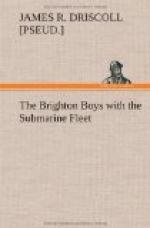Several days later while cruising in the North Sea a call came to the Monitor—–a radiogram from the flagship of the American admiral, summoning the sub to a rendezvous with other allied submarines for important instructions.
CHAPTER XXIV
INTO ZEEBRUGGE
The appointed time the Monitor arrived with other units of the American submarine fleet at the designated point off the English coast, to which point the undersea flotilla had been ordered by wireless. There, awaiting them, was the Admiral’s flagship, and all around her trim vessels flying the Stars and Stripes—–“sentinels of democracy.”
In the fleet mobilized the Monitor spoke several vessels that had accompanied the Dewey across the Atlantic on her first voyage into the war zone; there, also, were many other submarines built in American shipyards and now in commission in the North Sea activities. It was a wonderful picture well calculated to stir the blood of indomitable spirits like Jack Hammond and Ted Wainwright.
In response to a call from the flagship the Monitor came alongside and Lieutenant McClure with his executive officer and his aide went aboard. From the Admiral himself they received warm commendation for the heroic exploits of the converted U-boat, with special reference to the individual deeds of Ensign Hammond and Ensign Wainwright.
“Permit me to present you two brave lads with these,” said the American Admiral as he took from his aide two official envelopes and handed them to Jack and Ted. Saluting, the two boys took the communications and stepped back beside their commander. The Admiral and Lieutenant McClure withdrew and went below, leaving Jack and Ted on the forward deck under the giant fifteen-inch guns of the battleship Pennsylvania, flagship of the American North Sea fleet.
The Brighton boys proceeded to open the official documents and found commissions signed by the Secretary of the Navy delegating to them the rank of first lieutenant, U.S.N.
Needless to say both boys were quite elated over their rare good fortune. It was, indeed, a moment for elation, considering their short term of service in the navy. Each had won his spurs in the great arena of service through devotion to duty and the flag and by exercising that rare courage and initiative that has characterized the fighting men of the U.S. Navy.
“I’m glad for the sake of dear old Brighton that we have made good, aren’t you, chum?” asked Jack.
“You’ve said it, old boy!” answered Ted.
And then the lads for a moment digressed from the great war to talk of dear old “room 63” back there on the third floor of the dormitories under the campus oaks, with the lights of the town gleaming at night from the windows. It was the first time they had approached anything like “homesickness” as each confessed he would like once more to stroll up the campus and “see the boys.”




